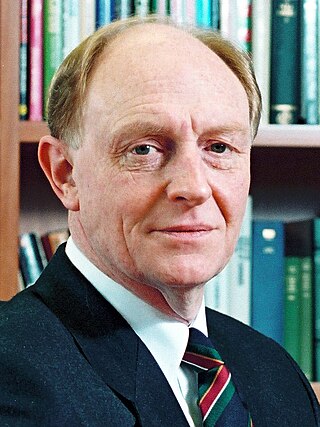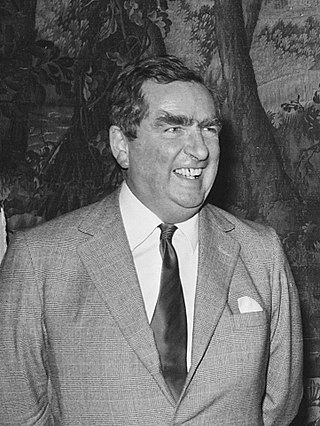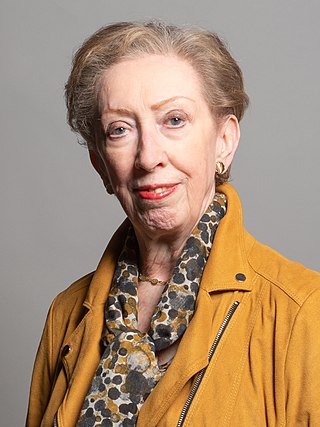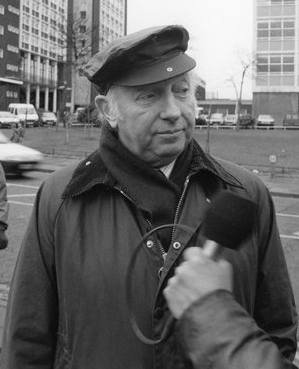Related Research Articles

Neil Gordon Kinnock, Baron Kinnock, is a Welsh politician who was Leader of the Opposition and Leader of the Labour Party from 1983 to 1992. He was a Member of Parliament (MP) from 1970 to 1995, first for Bedwellty and then for Islwyn. He was Vice-President of the European Commission from 1999 to 2004. Kinnock was considered to be on the soft left of the Labour Party.

The 1983 United Kingdom general election was held on Thursday 9 June 1983. It gave the Conservative Party under the leadership of Margaret Thatcher the most decisive election victory since that of the Labour Party in 1945, with a majority of 144 seats and the first of two consecutive landslide victories.

Anthony Neil Wedgwood Benn, known between 1960 and 1963 as The Viscount Stansgate, was a British Labour Party politician and political activist who served as a Cabinet minister in the 1960s and 1970s. He was the Member of Parliament for Bristol South East and Chesterfield for 47 of the 51 years between 1950 and 2001. He later served as President of the Stop the War Coalition from 2001 to 2014.

Roy Sydney George Hattersley, Baron Hattersley, is a British politician, author and journalist from Sheffield. A member of the Labour Party, he was MP for Birmingham Sparkbrook for over 32 years from 1964 to 1997, and served as Deputy Leader of the Labour Party from 1983 to 1992.

Denis Winston Healey, Baron Healey was a British Labour Party politician who served as Chancellor of the Exchequer from 1974 to 1979 and as Secretary of State for Defence from 1964 to 1970; he remains the longest-serving Defence Secretary to date. He was a Member of Parliament from 1952 to 1992, and was Deputy Leader of the Labour Party from 1980 to 1983. To the public at large, Healey became well known for his bushy eyebrows, his avuncular manner and his creative turns of phrase.

The 1987 United Kingdom general election was held on Thursday 11 June 1987, to elect 650 members to the House of Commons. The election was the third consecutive general election victory for the Conservative Party, who won a majority of 102 seats and second landslide under the leadership of Margaret Thatcher, who became the first Prime Minister since the Earl of Liverpool in 1820 to lead a party into three successive electoral victories.

Margaret Mary Beckett, Baroness Beckett,, is a British politician. She was a Member of Parliament for more than 45 years, from 1974 to 1979 and 1983 to 2024. A member of the Labour Party, she was the United Kingdom's first female Foreign Secretary, and served as a minister under Prime Ministers Harold Wilson, James Callaghan, Tony Blair and Gordon Brown. Beckett was Deputy Leader of the Opposition and Deputy Leader of the Labour Party from 1992 to 1994, and briefly Leader of the Opposition and acting Leader of the Labour Party following John Smith's death in 1994. A member of the Labour Party, she served as Member of Parliament (MP) for Lincoln from 1974 to 1979, and for Derby South from 1983 to 2024. Her 45 years in the House of Commons makes her the female MP in the Commons with the longest service overall and she was the last sitting MP who served in the Labour governments of the 1970s. Beckett alongside former Labour Party colleague Baroness Harman became members of the House of Lords in 2024.

David John Denzil Davies was a Welsh Labour Party politician. He served for 35 years as the Member of Parliament (MP) for Llanelli from 1970 to 2005. He was a Treasury Minister (1975–1979); a member of Labour's Shadow Cabinet team (1979–1988); and a member of the Privy Council.
The Socialist Campaign Group, also simply known as the Campaign Group, is a UK parliamentary caucus of the Labour Party including Members of Parliament in the House of Commons. The group also includes some MPs who formerly represented Labour in Parliament but have had the whip withdrawn or been expelled from the party.

Tribune is a democratic socialist political magazine founded in 1937 and published in London, initially as a newspaper, then converting to a magazine in 2001. While it is independent, it has usually supported the Labour Party from the left. Previous editors at the magazine have included Aneurin Bevan, the minister of health who spearheaded the establishment of the National Health Service, former Labour leader Michael Foot, and writer George Orwell, who served as literary editor.
The soft left, also known as the open left, inside left and historically as the Tribunite left, is a faction within the British Labour Party. The term "soft left" was coined to distinguish the mainstream left, represented by former leader Michael Foot, from the hard left, represented by Tony Benn. People belonging to the soft left may be called soft leftists or Tribunites.
The Labour Co-ordinating Committee (LCC) was a faction in the British Labour Party, established in 1978 and wound-up in 1998. It moved from a group established to challenge the leadership of the party from the left to the vanguard of Tony Blair's drive to modernise the party's organisation and policies.

Eric Samuel Heffer was a British socialist politician. He was Labour Member of Parliament for Liverpool Walton from 1964 until his death. Due to his experience as a professional joiner, he made a speciality of the construction industry and its employment practices, but was also concerned with trade union issues in general. He changed his view on the European Common Market from being an outspoken supporter to an outspoken opponent, and served a brief period in government in the mid-1970s. His later career was dominated by his contribution to debates within the Labour Party and he defended the Liverpool City Council.

Michael James Meadowcroft is a British author, politician and political affairs consultant. He served as the Member of Parliament (MP) for Leeds West from 1983 to 1987.
The 1988 Labour Party leadership election saw Tony Benn, identified with the left wing of the British Labour Party, challenge the incumbent leader Neil Kinnock identified with the more moderate social democratic wing.

Neil Kinnock was Leader of the Labour Party and Leader of the Opposition from 2 October 1983 to 18 July 1992. He convincingly defeated Roy Hattersley, Eric Heffer, and Peter Shore in the 1983 leadership election, which was prompted by Michael Foot's resignation following the disastrous general election result earlier that year. Kinnock's period as Leader encompassed the bulk of the Thatcher premiership and the first two years of the Major premiership. Kinnock resigned in 1992 after losing his second election as Leader.

Arthur Scargill is a British trade unionist who was President of the National Union of Mineworkers (NUM) from 1982 to 2002. He is best known for leading the 1984–1985 UK miners' strike, a major event in the history of the British labour movement.
The Militant tendency, or Militant, was a Trotskyist group in the British Labour Party, organised around the Militant newspaper, which launched in 1964.
Labour Listens was a consultative exercise by the British Labour Party. It was appointed after Labour's third successive defeat in 1987 to discover why Labour was unpopular and to help the party formulate policies more in tune with public opinion. Neil Kinnock, the leader of the Labour Party at the time, called it "the biggest consultation exercise with the British public any political party has ever undertaken".
Labour Party Black Sections (LPBS), commonly known as Black Sections, was a caucus made up of Labour Party members of African, Caribbean, and Asian descent from 1983 to 1993. Its aims were campaigning against racism, demanded political representation of black and Asian members and establishing a group in the party.
References
- Robin Oakley, ‘Kinnock gets mandate for major changes’, The Times (29 September 1987), p. 1.
- Robin Oakley, ‘Kinnock wins backing for policy reform’, The Times (4 October 1988), p. 1.
- Robin Oakley and Philip Webster, ‘Defence row shadow over Kinnock win’, The Times (3 October 1988), p. 1.
- Robin Oakley and Philip Webster, ‘Labour back Kinnock in nuclear vote’, The Times (3 October 1989), p. 1.
- Philip Webster, ‘Labour seeks policy review backing’, The Times (15 September 1987), p. 2.
- Philip Webster, ‘Labour sets a new course’, The Times (25 May 1988), p. 8.
- Philip Webster, ‘Anger on left at Kinnock's nuclear switch’, The Times (6 June 1988), p. 1.
- Philip Webster and David Cross, ‘Kinnock wins crucial battle over defence’, The Times (10 May 1989), p. 1.
- Philip Webster and Martin Fletcher, ‘Kinnock is attacked by Labour left wing’, The Times (26 October 1987), p. 2.
- Philip Webster and Nicholas Wood, ‘Labour starts rethink over election failure’, The Times (9 September 1987), p. 1.